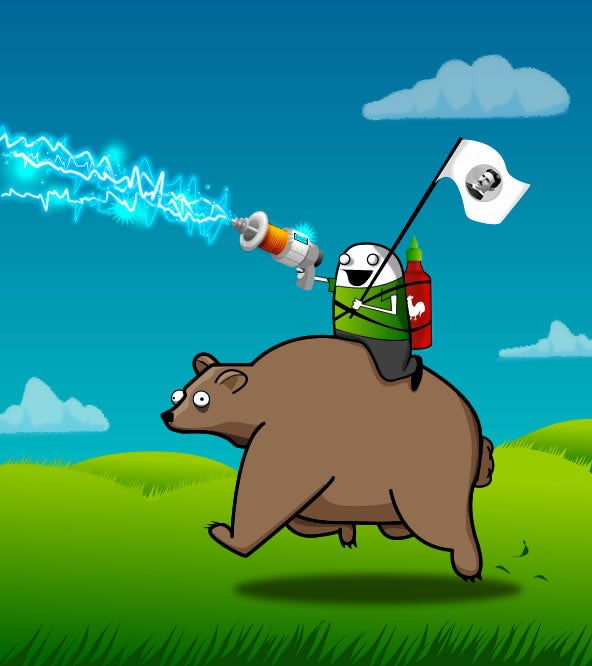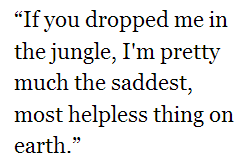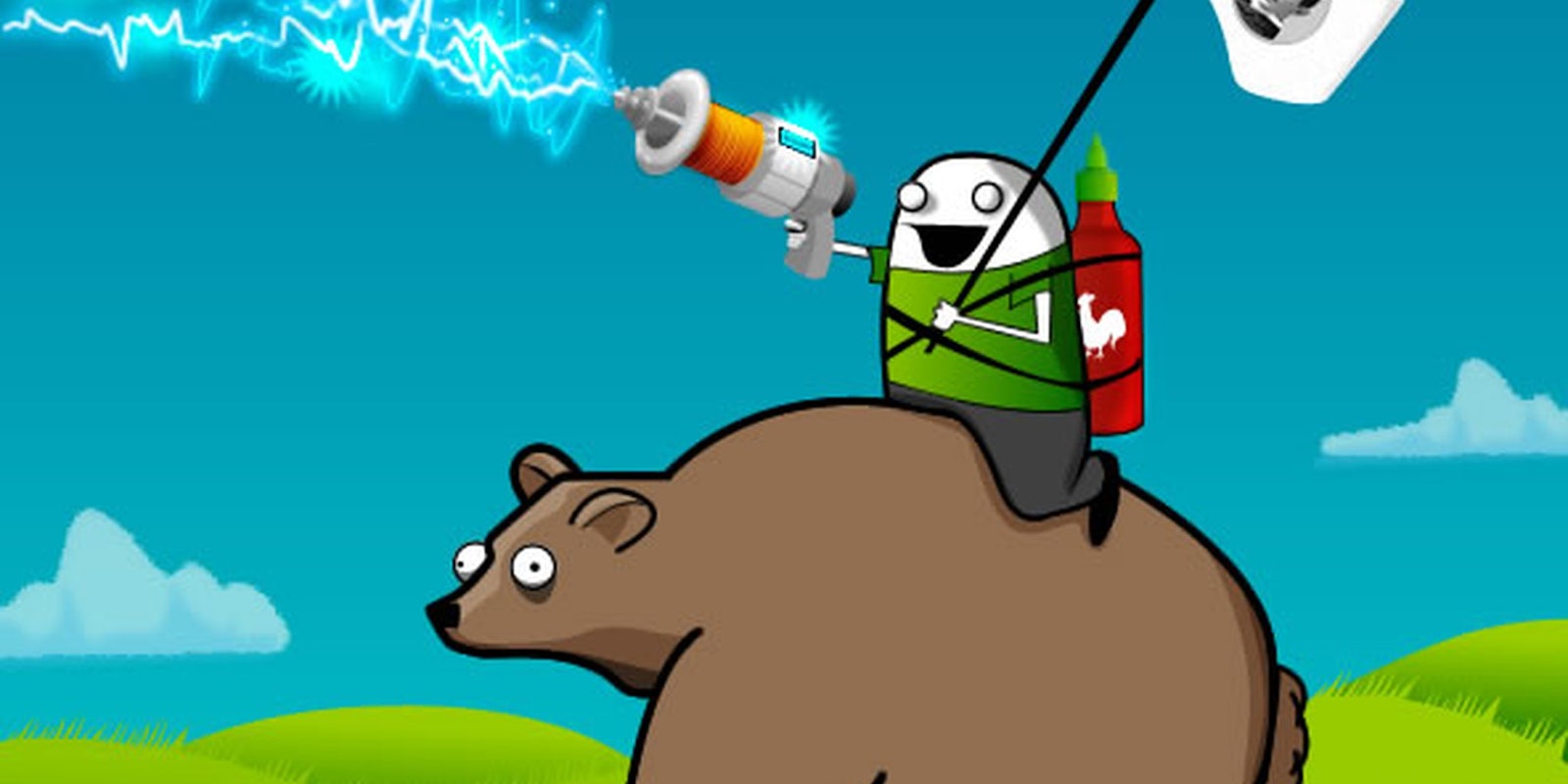
There are things to know about Matthew Inman—very few of them actually matter.
He’s 30, a resident of Seattle, Wash. He’s a democrat who’s voted for Obama twice. He trains for ultra marathons, the ones that extend for 100 full miles. He has a brother, a sister, a girlfriend, and a New York Times bestseller, How To Tell If Your Cat is Plotting to Kill You, which has sold more than 450,000 print copies.
But what matters with Inman is that on an Internet of loudmouths, he speaks for everyone.
Since launching The Oatmeal in 2009, Inman has delivered sermons to more than 5 million fans a month on subjects like religion, the state of the music industry, and why we love our dogs. More than anyone, Inman knows what entertains us, what ignites us, what entices us, and what annoys us to the point of no return. He’s mastered the art of finding that trigger detail in the dirt and zooming out until he’s focused on something bigger, and he knows how to bring his readers along for the ride.

In the years since opening The Oatmeal as little more than a comic blog, Inman has built himself an empire that’s blossomed into a full-on Internet enterprise pushing everything from T-shirts and mugs to Sriracha-flavored lip balm that he sells for $11.99. The Oatmeal pulled in more than $500,000 in merchandise and advertising revenue last year, and Inman doesn’t even have a manager. (His mother, who he says lives “in the middle of nowhere,” helps him handle merchandise, inventory, and shipping.)
“It’s a strange profession to explain to people who work on the Web, even,” Inman explained last week. “To them, being a webcomic artist means that you Best Buy and make comics on your weekends. No one sees it as a career. It’s harder to get credibility, and understandably so. There are a zillion webcomics out there, and most do it as a hobby.”
On the heels of his most successful and controversial year yet—and before his keynote address at the South by Southwest Interactive conference—Inman spoke to the Daily Dot about his work, BuzzFeed, and how the Internet has changed our lives.
Daily Dot: You’ve called yourself a content creator. I was raised to read that as a dirty word. Do you wish to defend its meaning?
I’d never heard that word in a negative light until I posted my comic, Some Thoughts and Musings About Making Things for the Web, where I talk about being a content creator. As soon as I posted it, people were like “Aw, I hate that word.” I just think it’s debating semantics. I can see how being a content creator would be construed as just putting crap up on your site for marketing purposes, but I don’t have much of an opinion.
I have an impossible time describing to people what I do. People ask and I tell them I’m a cartoonist, and they think that I make stuff like Batman, or The Simpson. It’s impossible. I usually settle on Internet writer.
DD: You’ve had quite a year: You wrote your most popular comic. You launched the quest to save Nikola Tesla’s lab. You donated a lot of money to some very worthy causes; FunnyJunk threatened to sue you for embellishment, even after the site had lifted your comics.
This past year was the most amazing year of my career—the FunnyJunk thing and working with the National Wildlife Federation. I got to meet a bunch of grizzly bears because of that, and I got to meet Nikola Tesla’s last remaining relative. It was tumultuous in a good way. The BuzzFeed thing [a reference to Jack Stuef’s controversial BuzzFeed profile that Inman just as controversially responded to], I look at that like an orangutan smearing shit on a canvas in the corner. That’s sort of my opinion of Mr. Stuef.
DD: What do you make of the ethos behind sites like Reddit and Digg that the things that deserve attention will actually receive it thanks to the Internet’s democratic voting methods?
Alexis Ohanian said that site likes Reddit sort of level the playing field for everybody. Your link counts as much as my link. They both count just as much as a link from the New York Times.
From a cartoonist’s perspective, it’s a nice place to be. The old way the funnys worked was that you got syndicated and then your comic would be in the paper for decades, whether somebody funnier than you came along or you became unfunny. Now, comics are rewarded by attention being showered democratically. If they’re great and systematically funny, they show up on Reddit and Facebook and everywhere. If they become unfunny, they don’t show up as often. That’s great, and that’s why our community’s been able to blossom right now.
DD: Do you consider endeavors that are definitively rooted outside of content creation—Tesla Museum support, Indiegogo campaign in response to FunnyJunk—part of your professional platform?
I didn’t do those things because of my job. The FunnyJunk deal was self-defense. I was worried that he’d prevail. With the Tesla Museum, I just thought that I could help. I was really the only individual in a situation to do that, because I have this audience of people who are Tesla fans. I never really wanted that kind of life to be my job to begin with, so unless the opportunity pops up that’s perfect, I probably won’t do another one anytime soon.
I donated quite a bit of my own money to various organizations last year, and I didn’t announce it. I didn’t need to turn it into a career. My strength has always been making comics, not necessarily being a philanthropist.
DD: In your State of the Web Winter 2012-2013, you include a conversation between a sucker and an Internet service provider. What kind of affect is the Internet having on our independence right now?
I can code in a bunch of languages, and I can fix databases. I can draw, and I can do all of these amazing things on the Web. But watch me change a car tire. It’s sad. If the Internet went away and I had to do real things with screwdrivers and hoses, it would be sad. But I only speak for myself.
My brother is a physician. If you dropped him in the jungle, he’d be very useful. He could find people with spears in them and pull them out and stitch them up using bamboos or whatever. If you dropped me in the jungle, I’m pretty much the saddest, most helpless thing on earth.
DD: What type of separation does Matthew Inman get from the Oatmeal?
It’s a mix. When I make comics that have me being grumpy or angry about something, I’m typically grumpy or angry about that thing.
DD: What’s happened to your privacy?
I’ve started being more careful with it. The idea that anything I write or draw will be there forever is something that I’m more conscious of.
We’re lucky. I see these teenagers who post things on the Internet that are so stupid and so embarrassing. They don’t even know that that’s going to be there forever. I’m just thankful that I didn’t get on YouTube and cry and say “That guy’s a jerk,” and that gets 20 million views. I feel like I was spared that.
DD: Aside from knowing how to write a slug, to what degree does your run in the SEO world benefit the work you do on-site?
SEO is part of a holistic Web thing. For instance, properly writing your CSS code is very important. It makes your site readable. Writing the right title tags is important so that people know what they’re clicking on. Using alt-tags is important because if a blind person wants to read your website, that helps them help get the gist of what’s going on. These are all parts of making your website work, and SEO is one of those parts.
The work I do that’s SEO on The Oatmeal is pretty much just that. My title pages, if someone googles “The Oatmeal,” people can find it. Beyond that, SEO has no bearing on The Oatmeal. In fact, my whole website is images with no alt-tags. If you wanted to google a phrase I wrote, my site probably wouldn’t show up because it’s based on an image. The SEO on my site is actually very bad.
DD: You’ve created a nice relationship with Indiegogo. Do you harbor reservations about the rapid ascent of crowdfunding? What do we need to be wary of?
I don’t have any real reservations about it. I actually feel pretty new to it. I’ve only done two campaigns, and neither was very traditional. One thing I’ve noticed recently, which isn’t a bad thing, is that people are having crowdfunding campaigns to do nothing but market their product better. It works, and it’s great, but it’s just an example.
If I went to the bank and got a $20,000 loan and used it to write a book or make a video game and then took that game and put it on my website and said ‘Hey everybody, I bought a game. You can buy it,’ that wouldn’t do very well. But if I made a Kickstarter and tried to raise $20,000, it would probably blow up and go crazy, even though it’s pretty much the same exchange.
Think about e-books. You don’t need any money to write an e-book, but you can go to Kickstarter and open a campaign and it’s a much more visible way of making money. This isn’t a bad thing, it’s just something that I’ve noticed.
DD: Do you think that the standards for ownership of intellectual property should be any different on the Internet than it is offline?
You have to lightly police and understand that it’s the law of the jungle. It’s so easy to copy an image and paste it somewhere else that you kind of have to learn to let go.
The reason why I drew a line with FunnyJunk was that it was hundreds and hundreds of comics for years and years. But my comics get pasted all over the place. I’m fine with it. As long as they put my name on it and give me some sort of credit, I’m not trying to police it.
Copyright on the Internet should be treated differently. I think it should be a lot more relaxed. I think the Internet blossomed because there wasn’t any policing of copyright in the beginning.
DD: You said that the comic about your house burning down was the most rewarding one you’ve ever worked on. Why did you decide to spend so much time on it?
I didn’t choose to, really. I started writing it, and it got long. When I started to draw, it got even longer. It became this thing where I sort of realized that I can’t shorten the story any more than I already have. This was as small as I could get it. It ended up just taking forever.
I don’t normally do that. I try to avoid overanalyzing my writing, because when I do it strips the visceral sound out of it and makes it more neutral. But with this, I did rewrite it 10 times. I obsessed, and I wanted it to be perfect, because it was personal.
I also stopped using Adobe Fireworks, which is a terrible program for comics. It’s a Web design program, and it required that I draw everything using the mouse. I’d click a point, click another point, and draw a line that way.
With the fire comic, I switched to Adobe Illustrator, and I started to work on a tablet. That comic was 100 hours of working on the tablet. Even though I was staying awake day and nights trying to get it done in time for the reunion of the fire, it was one of the most fun projects I’d worked on in a long time.
DD: How was the reception for it?
The reaction was great. It’s not the kind of comic where everybody’s going to share. My dog comic, anybody who’s ever owned a dog is going to read that and like it. This was more of a personal story for me. The traffic was less than the big comics that I’d done, but it did well. That was really cool to see, to know that I could make a comic that wasn’t titled “5 Very Good Reasons to Bacon Your Social Media Unicorn.” This was a story about my house going up in flames.
The Oatmeal illustration courtesy of Matthew Inman


